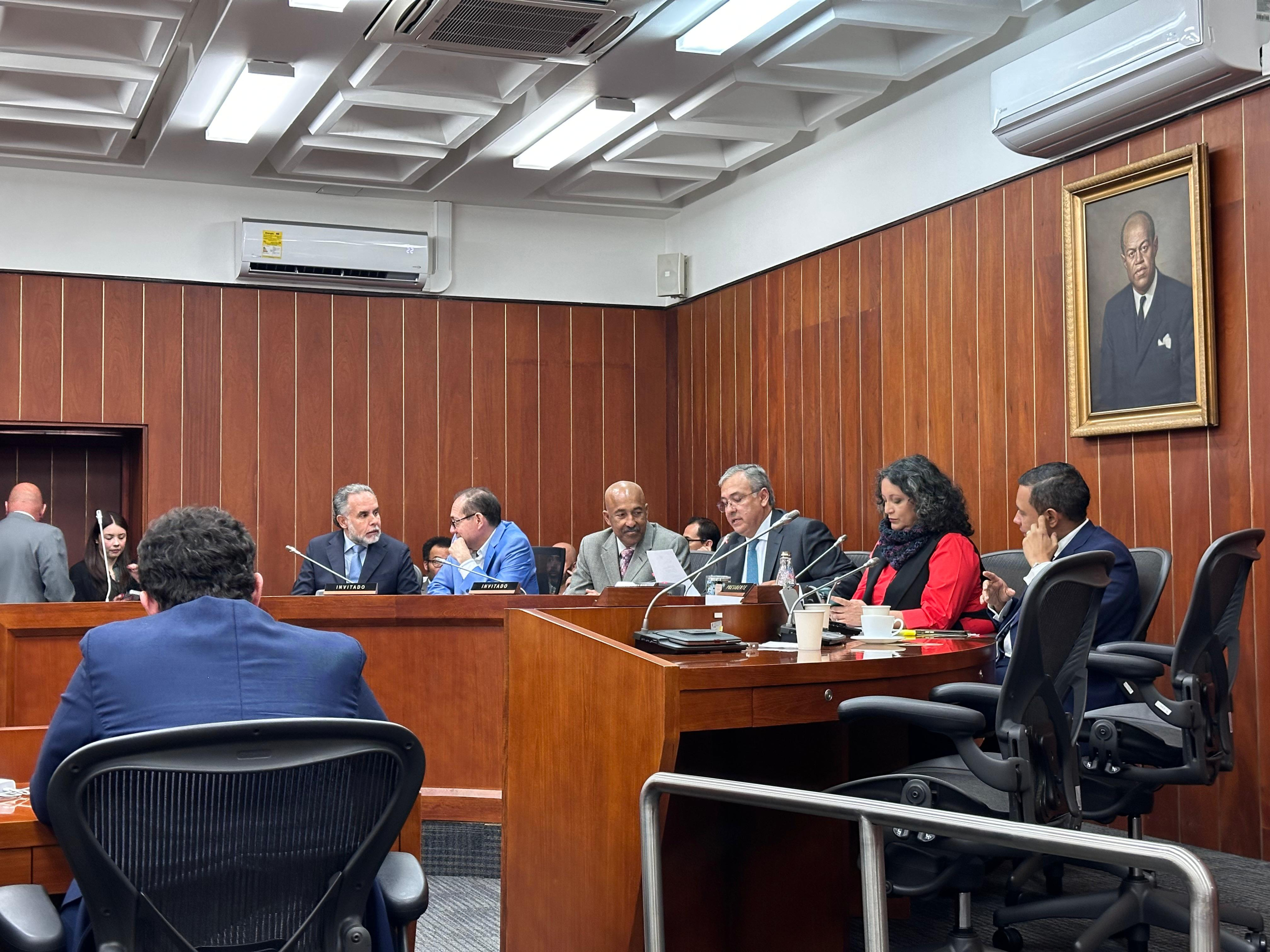The rifts between merchants and businessmen that the new discussion on labor reform is beginning to leave behind

The country's merchants are not entirely convinced by the proposal put forward by the country's business leaders for an "exceptional regime for micro and small businesses and the restaurant, hotel, commerce, and security sectors, which would be the most affected. They also want a differentiation between holidays and Sundays, and for everything to be implemented gradually starting in 2027," as Bruce Mac Master, president of Andi, recently stated.
However, merchants insist on the need for this project to have structural adjustments aimed at addressing the serious problems the country has in terms of unemployment and informality and not focus only on claiming the rights of those who currently have jobs, and that while this persists they will not support the labor reform project that is beginning its discussion in Congress.
In an interview with EL TIEMPO, Jaime Alberto Cabal, president of the National Federation of Merchants (Fenalco), said that this initiative cannot be a consolation prize for the government having sunk the referendum.
The leader accused some unions of working only for their own interests and not for others, while pointing out that genuine labor reform should not harm sectors such as commerce, which generate 33 percent of the country's employment, 42 percent of women's employment, and 36 percent of youth employment.
Is Fenalco distancing itself from other unions seeking to reach agreement on certain issues, such as those related to working hours and pay for Sundays and holidays? The fact that the labor reform bill has been revived doesn't mean it's no longer a bad thing, especially since there's a conciliatory spirit among the senators who scuttled the referendum and revived the bill as a consolation prize for the government, but with significant damage to employment and millions of Colombians. This isn't an initiative aimed at combating informal employment, and the fact that there's a wave of efforts to push it forward today doesn't mean it won't cause serious harm to the country.
Unfortunately, some business sectors have preferred to join in the push for this bill to be passed, trying to avoid a new referendum or to evade the government's threats to paralyze the country. Therefore, at Fenalco, we want to make it public that, despite the labor reform, which may be less negative, it is not in the best interest of the country.

Jaime Alberto Cabal, president of Fenalco. Photo: César Melgarejo. EL TIEMPO Archive
I see it as very difficult because many unions are acting individually for their own interests and not collectively for the benefit of others. I also see that many senators, who have this responsibility, are doing so under pressure. So, when a bill isn't done, studied, or discussed with sufficient time, because this legislative session is ending soon, what emerges will be a patchwork quilt that, I insist, may be less bad, but that doesn't take away from how bad the overall context of the labor reform is.
Do you think this division between business leaders and merchants could hinder the success of this reform? Without a doubt, the current scenario of rushing through a labor reform bill, doing it under pressure as a consolation prize for the government for having sunk referendum one, for fear of holding referendum two, for fear that (Gustavo) Petro and his government will take to the streets and set everything on fire, creates an environment that is not conducive to discussing and approving the labor reform that Colombia needs. It's too late. We unions grew tired of telling the government from day one that we structured a reform aimed at generating employment and combating informality. We grew tired of telling it to be negotiated. None of that was done, and now, at this late stage, they're trying to rush through one in less than a month.

The private security sector is among those most affected by the approval of the labor law. Photo: EL TIEMPO Archive
Because it is based on improving workers' rights, but not the conditions of the millions of unemployed, jobless, and informal workers. It cannot be ignored that the sectors that generate the most employment, such as the trade cluster, will be the "payers" of this consolation prize for the government; this is something the country should be aware of.
The least possible harm would be to exclude neighborhood stores, bakeries, cafes, transportation companies, security, maintenance, and lodging providers, restaurants and bars, among others, from the labor costs that will increase due to the reduction in daytime hours and the increase in Sunday and holiday pay, as well as the labor contracts for SENA apprentices. Therefore, we are somewhat distancing ourselves from the idea that we all now have to make an effort, which is the position of other unions, because the hardest hit sectors are those we represent at Fenalco.
Is excluding these sectors from trade not enough to prevent damage to this sector, which is one of the largest generators of employment? Indeed, that's why I say that the only thing Congress can do right now, given a bad labor reform bill, is to make it less bad, because the bill is still bad and very damaging to the country, to job creation, to the unemployed, and to the informal sector.
You've mentioned that if the project isn't structurally reformed, they won't support it. What fundamental changes are needed? The text should reflect incentives, for example, for job creation, public policies that help the unemployed and informal workers access formal employment; and employment contracts should be more flexible rather than more rigid, so that this unemployed workforce can more easily find work. The more expensive job creation becomes, the more informal employment is fostered and the more it discourages hiring the unemployed.
We believe that the possibility of temporary hiring, fixed-term contracts, even hourly contracts should prevail, to give the unemployed and informal workers the opportunity to find employment and to ensure they have all their benefits.
For example, businesses that operate at night, on Sundays, and holidays, if they are not motivated to generate more employment and are instead penalized with higher labor costs, will end up reducing their staff, stopping hiring overtime workers, and eliminating work shifts. This is why we insist on a structural reform that includes less rigid employment contracts, lower costs, and incentives for those who generate employment, as has been the case in the past. This is not done through the stick, but through the carrot, because otherwise the country will not be able to solve its serious problem of unemployment and informality. As long as the spirit of the reform is simply to vindicate workers' rights, in the medium term, what we will experience here is a significant loss of jobs.

Unemployment and informality are two problems the labor reform bill doesn't address: Fenalco. Photo: El Tiempo Archive
Not under the conditions under which the House Letter Committee was presented, not at all. If we see that there could be an article with less negative impact and that includes some incentives for job creation, we would in some way be supporting it.
Have you talked to other unions about what you're mentioning? Yes, with other affected sectors, such as security, gastronomy, and tourism, but unfortunately, there are other sectors that are deeply affected by the reform because they don't generate employment at night, on Sundays, or on holidays. They are very large, so they can absorb those costs and will surely pass them on to the market or to the consumer.
Isn't it a contradiction that the government insists on rigid contracts when it's the public sector that most relies on temporary contracts? Of course, it's perverse and completely inconsistent, because the articles always try to stipulate that private, rather than public, companies should be the ones to adopt these proposals. But one of the biggest generators of temporary contracts is the State at all levels. It's also incoherent and incomplete that the public sector has been excluded, and obviously, we already know the levels of bureaucracy this creates for the Government, and these obviously aren't productive employment contracts. We believe that the possibility of temporary contracts, fixed-term contracts, even hourly contracts, should prevail, to give the unemployed and informal workers the opportunity to find employment and ensure they receive all their benefits, but under a hiring system that isn't so costly.

Labor reform is being discussed in the Fourth Committee. Photo: Fourth Committee
Unfortunately, this is the style of this government. It's generating pressure through threats and de facto measures, which will further harm the people, the productive apparatus, and the workers themselves. It also somehow intimidates the senators who are responsible for debating this bill, who are responsible for debating whether or not to re-approve the referendum. We are witnessing a scenario of inconsistencies and pressure, where today a labor reform bill and a health bill are being processed, but at the same time, the government ignores the jurisdiction of Congress, its legitimacy, and its institutionality, and is using the same questions to pressure a referendum it wants to move forward. Unfortunately, this has generated fear among some members of Congress and some union and business sectors.
eltiempo





